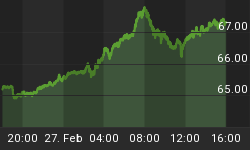In 1980, when the U.S. economy was last in serious trouble, Ronald Reagan offered the correct diagnoses that government was the problem and not the solution. His message resonated with voters, propelling him into the White House to implement an agenda of lowering marginal tax rates, reducing government spending and business regulations, restoring sound money, abolishing entire government departments, and basically allowing free market vibrancy to unshackle an economy burdened by big government. Though in practice much of the Reagan revolution never materialized, at least in theory his basic premise was sound.
In contrast, the country has now hitched its wagon to the views of Barack Obama. We don't know much about what he truly believes about economics, but the little that we do know is not encouraging. Obama has repeatedly heaped the blame for the current crisis on the excesses of unregulated capitalism and the greed of the wealthy. For him, the free market is the problem and government is the solution.
The President-elect has promised to cage the destructive forces of capitalism, impose more regulation, raise marginal tax rates, increase government spending, and restore prosperity by redistributing wealth from those who earned it to those considered to be more deserving. Like most of his generation, Obama believes that economic growth results from consumer spending, primarily from the middle class. Any policy that keeps the consumers headed to the mall will be promoted.
Unfortunately, while Reagan had a hard time getting his full agenda through Congress, Obama will likely be much more successful. The effort to concentrate more power in Washington will be far more appealing to Congress then Reagan's idea of restoring it to the people.
This sharp contrast in philosophy should not be taken lightly. Reagan looked to unleash the pent-up free market forces that had been smothered by a generation of Great Society reforms and uninterrupted Democratic control of Congress. Today, the public is looking for the Obama Administration to create the growth that the free market has apparently destroyed. The hope that our economy will grow as a result of government spending and micro-management is the most seminal shift in political philosophy since the New Deal.
Despite the absence of Reagan's promised spending cuts, the economy generally did well during his presidency (The growth would have been more genuine if the cuts had been delivered). However, Obama's policies will immediately make the current situation worse and the nation will suffer severely as a result. Rather than a sharp recession at the beginning of his term followed by a significant expansion, the recession that Obama inherits will be far worse when his first term ends.
What nearly all politicians, on both sides of the aisle, fail to understand is that the current contraction and credit crunch is necessary to restore order to an economy that is horribly out of balance. Years of misguided fiscal and monetary policy and market-distorting regulations have resulted in reckless borrowing and spending on Main Street, pervasive gambling on Wall Street, and rampant fraud and corruption at every intersection. America's borrow and spend economy, and the bloated service sector that evolved around it, must be allowed to topple, so that a more sustainable economy grounded in savings and production can rise in its place. Any government efforts to delay the adjustment and spare us the pain will backfire, turning this recession into an inflationary depression.
Of broader concern however is the sharp turn in ideology, and what it means for the future of our nation. If this is a permanent shift, then America will lose any resemblance to the economic titan of the 20th Century. Our standard of living will decline sharply, our economy will be ravaged by inflation, tens of millions will be unemployed, more individual liberties will be surrendered, and rugged individualism will be supplanted by the nanny state. In short, Latin America may extend north to the Canadian border.
However, if this shift proves temporary and Obama's reign either ends in one term or if he can summon the intelligence and courage to reverse course once the situation deteriorates, then perhaps one day there will be light at the end of a very long tunnel.
While all of us can certainly hope for the best, prudence suggests that we had better prepare for the worst. Not only does that mean divesting our portfolios of U.S. dollar denominated investments but preparing for the possibility of emigration. With economic conditions at home becoming increasingly intolerable, the call of freer economies and greater prosperity abroad may be too tempting to resist.
For a more in depth analysis of our financial problems and the inherent dangers they pose for the U.S. economy and U.S. dollar denominated investments, read my just released book "The Little Book of Bull Moves in Bear Markets." Click here to order your copy now.
For an updated look at my investment strategy order a copy of my new book "Crash Proof: How to Profit from the Coming Economic Collapse." Click here to order a copy today.
More importantly, don't wait for reality to set in. Protect your wealth and preserve your purchasing power before it's too late. Discover the best way to buy gold at www.goldyoucanfold.com. Download my free Special Report, "The Powerful Case for Investing in Foreign Securities" at www.researchreportone.com. Subscribe to my free, on-line investment newsletter, "The Global Investor" at http://www.europac.net/newsletter/newsletter.asp.















